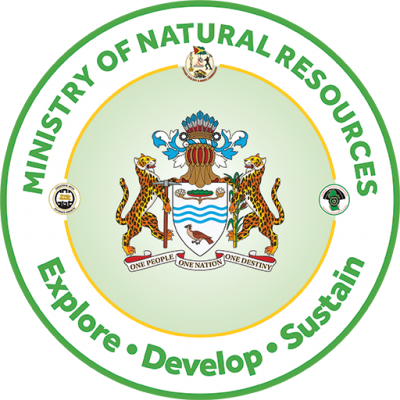
The National Inception Workshop for the Development of the National Action Plan (NAP) for the Artisanal Small-Scale Gold Mining (ASGM) Sector in the Co-operative Republic of Guyana
Date: Tuesday, November 5, 2019
Time: 09:00 hours
Venue: Herdmanston Lodge, 65 Peter Rose Street, Queenstown
Dr. Shamdeo Persaud, Chief Medical Officer, Ministry of Public Health, Ms. Jewel Batchasingh, Director (ag) of the Basel Convention Regional Centre for Training and Technology for the Caribbean, Ms. Malgorzata Stylo, Associate Programme Management Officer, United Nations, Environment Programme, Deputy Registrar of the Pesticides and Toxic Chemicals Control Board, Ms Diane McDonald, Deputy Commissioner, Guyana Geology and Mines Commission (GGMC) and Representatives from the Environmental Protection Agency, Guyana Water Inc. and Conservation International – Guyana. Ms Aiesha Williams, Country Manager, World Wildlife Fund – Guyana, heads of the Guyana Women Miners Organisation (GWMO), Guyana Gold and Diamonds Miner Association (GGDMA) and the National Mining Syndicate (NMS), members of the National Working Group on the Minamata Convention, consultants of the Guyana NAP project, other key stakeholders and partners, members of the media, good morning.
Six years ago, on October 10, 2013 in Kumamoto, Japan, Guyana joined with other countries, and made a global pledge to control and address the use of mercury and committed to protect the environment and human health, for the current and future generations of people of the world. Our signing on to the Minamata Convention on Mercury and subsequent ratification in September 2014, were the formative actions we took in recognition of our commitment to sustainable development through fostering safer communities and healthier people.
The mining industry has been in existence for centuries and has built the foundation of Guyana’s development. In Guyana, the artisanal, small- and medium-scale gold-mining sector is significant to the national economy. The ASGM sector accounted for 6.1 per cent of Guyana’s GDP (gold and diamonds). In 2018, the sector not only generated approximately 33.6 percent of the foreign exchange earned from gold production of 361,971 ounces and also proved to be the main source of employment and revenue for hinterland communities, including indigenous ones, thereby providing direct employment for over 18,000 and approximately 30,000 indirectly. The reality is that mercury is used in our ASGM sector. Mercury, its use and its effects, has become a buzz topic and high on the national agenda of the Government of Guyana. We can neither postpone or avoid the discussion and action to be taken.
The Minamata Convention on Mercury is the only global legally binding multilateral agreement of the twenty-first century that focuses proportionally on the protection of the environment and human health. Its entry into force comes at the pivotal time as the world recommitted to the achievement of the Sustainable Development Goals and it aligns with the Ministry’s Responsible Mining Initiative and the country’s Green Living strategy. The Government of Guyana remains committed to implementing practical, effective and efficient measures for the reduction and elimination, where feasible, of the use of mercury in the ASGM sector and materialisation of H.E President David Granger’s 2027 commitment. The Minamata Convention, and the completion of our National Action Plan for the ASGM sector, inform and complement our efforts for the achievement of Agenda 2030.
Nationally, through the participation of the National Working Group on the Minamata Convention on Mercury, we encourage the active and invaluable participation of all our key partners in the completion of our NAP. We envisaged the NAP project will feed directly into our current mercury projects including the GEF GOLD’s A Supply Chain Approach to Eliminating Mercury in Guyana’s Artisanal and Small-Scale Gold Mining-(ASGM) Sector: El Dorado Gold Jewellery – Made in Guyana executed by Conservation International Guyana and vice versa. Through our Harmonisation Initiative, we will continue to work collaboratively to coordinate our mercury plans, projects and activities in the areas of Policy and Regulation, Health Aspects, Environmental Health, Occupation, Health and Safety, Monitoring and Evaluation, Technology, Markets, Education, Awareness and Communication and Restoration.
So today, maintaining our momentum and bringing to fruition H.E, President Granger’s commitment, we are making resolute progress in promoting sustainable development, and strengthening of global environmental governance, with the completion of our NAP for the ASGM sector. The completion of our NAP is a declaration of our national, regional and global commitment to making mercury history, and robustly combatting the effects of mercury use; while safeguarding the health and livelihoods of our people and their future generations and protecting the environment.
These objectives are pivotal components in our national objectives. We are cognizant of the important role of our ASGM miners, and will continue to engage them and all key actors, across all scales, from the initial discussion, to the drafting of the document and its implementation. We will ensure that we capture their realities, challenges and incorporate their institutional knowledge for the completion of a comprehensive document and guarantee its implementation and the achievement of our mutually shared objectives.
We want to thank all our stakeholders, locally, nationally, regionally and internationally for a fruitful partnership and getting us this far. We want to especially acknowledge the salient role of the miners in the economic structure of Guyana and our continuous development as a country. Our aim is to work with you to find common grounds in our transition to safer, cleaner, assessible, affordable mercury-free alternatives in mining, while ensuring there is minimal to no disruption to your livelihoods, threat to health and degradation to the environment we depend on for our living. As a government, we have an obligation and responsibility to you and the protection of your health and livelihoods remain our first priority!
Thank you and may God bless you!





